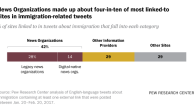Private Security Companies in Iraq – A PEJ Study
Exactly how many Americans are serving in Iraq and what they are doing there might not seem like complicated questions. Stories in the media regularly talk about the 150,000 U.S. military personnel in the Iraq theater. Coverage of events inside Iraq, which includes the actions of U.S. troops there, was the third-biggest news story in the American media for the first quarter of 2007, according to PEJ research.
But those numbers do not include some 30,000 employees of U.S. and European-based Private Security Companies (PSCs), who work in some of Iraq’s most dangerous areas.
These PSC employees are not like other contractors in Iraq. Many of them carry weapons and are hired to protect important people, facilities and convoys. They have been involved in firefights and scores of them, the exact number is unclear, have perished. Yet there are many basic unanswered questions about these armed forces, which add by 20% the number of foreign troops in the country.
As a starting point, the financing can be difficult to track. Some PSC personnel are paid directly by the U.S. government, while others work as sub-contractors or sub-sub-contractors for other companies doing business in Iraq.
The issue of who is in charge of them in the field also can be confusing. While PSCs work alongside the U.S. military in Iraq, ultimately they serve at the discretion of the groups that hire them. Those employers may be the government, but they could also be some third party.
One thing is clear. Private security companies are doing jobs once largely undertaken by the military. And experts say they are being used in unprecedented numbers in the war in Iraq.
“This is something new, this level of involvement” says Deborah Avant, a professor of political science at George Washington. Avant, who has closely studied the role of contractors in the conflict, says their numbers and the tasks they are performing make them unique in the history of U.S. military conflicts.
The extensive reliance on PSCs in the Iraq conflict appears to represent a significant new element in 21st Century warfare.
So what does the American public know about them? That raises the issue of how well the American news media are covering the story of the PSCs in Iraq.
In June 2007, both USA Today and the Washington Post published major front-page piece stories examining the growing use of PSCs in Iraq. But by and large, there are formidable obstacles for journalists trying to cover private security companies, and the media appear to be playing a game of catch-up.
To begin with, given the dangerous security situation throughout Iraq, it is difficult for reporters to locate PSC forces and spend time with them. For another, as private entities, the PSCs are under no obligation to cooperate with the media and their activities are hard to track. Certainly journalists are less likely to be able to embed with them as they do with standard military.
How much has the press covered this new element of the war? To answer that, PEJ examined coverage of this issue over the four-plus-year course of the war, using the searches of the Lexis/Nexis database.
The findings, put briefly, show Private Security Companies are a relatively unknown commodity in the mainstream media’s Iraq reportage.
[1]
In total, out of well over 100,000 stories dealing with the war over that period, PEJ found 248 stories dealing in some way with the topic of PSCs. And most of that coverage could be characterized as tangential references to private security contractors or companies inside larger stories about other Iraq-related issues or events. If one uses the most-heavily covered PSC – Blackwater USA – as a sole search term with the word “Iraq,” a greater number (more than 440 stories) appear. That would still place the tally at less than 1% of Iraq war coverage.
These are some of the findings of a Lexis/Nexis search of mainstream news outlets over those 49 months. Among the other findings:
- Even the total of 248 stories overstates the coverage in a sense. Some of those were the same story that ran in different outlets or a repeated airing of the same story. In June 2006, for example, CNN aired eight stories on PSCs, but five of those airings were actually the same report re-aired over a three-day time span. Of those 248 stories, 20 were also op/eds, meaning they were submitted by outside writers or written by editorial boards – and meant as commentary.[2]
- One news event, the March 2004 ambush of a team of Blackwater USA security contractors that ended with their burned bodies hanging from a bridge in Fallujah, accounted for more than a quarter (27%) of all the reporting on private security forces.
- Overall, print outlets dominated the coverage. Fully 81 of the 93 outlets that carried even a single story on PSCs were print. Five broadcast and cable outlets aired a total of 29 stories. Four online outlets posted a total of six pieces. Two wire services ran 10 stories. The remaining 203 appeared in newspapers and magazines.
- In all, 16 outlets did four or more stories that used the key search terms about PSCs beyond brief accounts describing injuries or deaths. Most of these stories were either tied to Blackwater or came from regional outlets with geographic connections to the Moyock N.C.-based security company. The Virginian-Pilot, based in nearby Norfolk, VA, was nominated for a Pulitzer Prize for a six-piece series on PSCs focusing on Blackwater. The News & Observer in Raleigh, NC, also stood out for its coverage.
- A handful of outlets stood out for their longer, more in-depth reportage. The Virginian-Pilot ran its lengthy series on PSCs. The New York Times published 17 stories, including the single longest one on the issue, an 8,000-word Sunday magazine piece. But most of the coverage took the form of spot news stories focused on specific PSC-related events.
- In the national media, NPR programs like Fresh Air and Talk of the Nation stood out for airing frequent coverage on the issue, though much of it came in the form of interviews with one person—P.W. Singer, an analyst from the Brookings Institution.
[1] PEJ looked for coverage on the Lexis/Nexis database by searching for “Iraq” with four different terms “private military contractors,” “private military companies,” “private military firms” and “private security companies”
[2] Many of the pieces in our 250-story count were duplicates that ran in different outlets. For instance, on April 2, 2004, shortly after the attack on the Blackwater PSCs in Fallujah, we found 13 stories, but seven of those were different edits of the same story from the Knight-Ridder newspaper chain. In September of 2003, the media chatter about the contractor Haliburton led five papers to publish a story from the New York Daily News about a call for an investigation of the company on Capitol Hill. And the four stories we counted on March 31, 2006 were all reprints or edits of the same story that ran March 30 in the Virginian-Pilot. In June 2006, CNN aired eight stories on PSCs, but five of those airings were actually the same story re-aired over a three-day time span.




